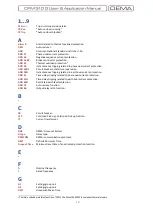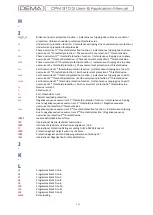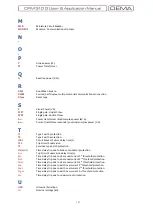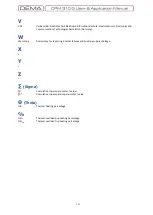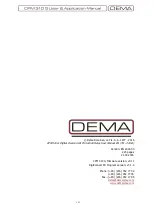
- 212 -
Technical Characteristics
Delaying Logic Selectivity Groups
2 groups, 1 setting for each group.
Trigger Options
tI>>, tI>>>, tI
e
>>, tI
e
>>>
Delaying Range
(0-500) s, in steps of (0-01) s.
CB Opening Time Supervision
Setting range: (0.05-1) s, in steps of 0.01 s.
CB Closing Time Supervision
Setting range: (0.05-1) s, in steps of 0.01 s.
CB Open Pulse
Setting range: (0.1-5) s, in steps of 0.1 s.
CB Close Pulse
Setting range: (0.1-5) s, in steps of 0.1 s.
CB Spring Supervision
Setting range: (0.1-600) s, in steps of 0.01 s.
CB Numerator Supervision
Setting range: 0-65355, in steps of 1.
∑ (Total Amperes) Supervision
Setting range: (0-12,000x104) A, in steps of 1 A.
∑² (Total Amperes-square)Supervision Setting range: (0-30,000x108) A², in steps of 1 A².
Triggers when the signal is lost on a programmed input.
tTCS : (0.1-15) s, in steps of 0.1 s.
Programmable LEDs
There are 8 programmable LEDs displayed as L5, L6, ..., L12 symbols on the
display. The LED Menu is accessed by hitting the Reset button once while on any
menu. Any activated LEDs will flash on the menu automatically.
One or more of the functions listed below are available for assigning to any of the
programmable LEDs. The label for the LED is set independently, as a LED may
represent several functions.
I>, I>>, I>>>, I
e
>, I
e
>>, I
e
>>>, tI>, tI>>, tI>>>, tI
e
>, tI
e
>>, tI
e
>>>, Thermal
Trip Θ, Broken Conductor, CB Failure, Programmable Inputs (#1, #2, #3, #4, #5,
#6, #7), tAux1, tAux2, Cold Load Pickup, ARCL Running, ARCL Blocked, Buchholz
Alarm, Buchholz Trip, Temp. Alarm, Temp. Trip, CB Alarm, I
2
>, I
2
>>, tI
2
>, tI
2
>>,
I<, tI<, Pressure Trip.
Labels available to assign to
Programmable LEDs
The label for each LED is set to only one of the functions listed above.
Latchable Outputs
Trip Relay and programmable outputs from RL1 to RL6.
Functions available to force trip relay
latching.
tI>, tI>>, tI>>>, tI
e
>, tI
e
>>, tI
e
>>>, tI<, tI
2
>, tI
2
>>, Thermal Trip Θ, Broken
Conductor, tAux1, tAux2, RL1-RL6, Buchholz Trip, Temperature Trip, Pressure
Trip.
Functions available to force
programmable outputs latching.
Any function that is assigned to an output may be set to latch the output.
Auto-reset Option for Alarm Menu
Automatic (new alarms are overwritten to the old ones) or Manual (new alarms
are recorded to the front lines, olds are kept below).
Threshold Alarm Hiding Option
Disturbances are shown or hidden by the option.
Trip Circuit Supervision
2.8.10 Programmable LED Settings
Functions available to assign to
Programmable LEDs
2.8.11 Latching Settings [ANSI 86]
2.8.8 Delaying Logic Selectivity Settings
2.8.9 Circuit Breaker Supervision Settings
2.8.12 Alarm Settings
2.8.13 Loading Default Settings
Loading Default Settings option is available at "MENU » System Settings" address. Password is required to carry out the
task.
Summary of Contents for CPM 310 G
Page 1: ...CPM 310 G Digital Overcurrent Protection Relay User Application Manual vEN 2016 03...
Page 2: ...2...
Page 6: ...6 ABOUT DEMA...
Page 11: ...11 INTRODUCTION...
Page 32: ...32 PACKING LABELING INFORMATION...
Page 34: ...34 OPERATING MANUAL...
Page 53: ...53 RELAY MENUS MANUAL...
Page 55: ...55 The Menu Tree...
Page 56: ...56...
Page 57: ...57...
Page 58: ...58...
Page 59: ...59...
Page 60: ...60...
Page 61: ...61...
Page 128: ...128 DIGICONNECT PC PROGRAM MANUAL...
Page 189: ...189 APPLICATION DIAGRAMS...
Page 191: ...191 Sample Power Transformer Protection Application Diagram...
Page 193: ...193 FUNDAMENTAL CABLING DIAGRAM...
Page 203: ...203 APPLICATION DIAGRAM NO 10 RS485 Cabling...
Page 204: ...204 TECHNICAL DATA...
Page 220: ...220 GLOSSARY...
























